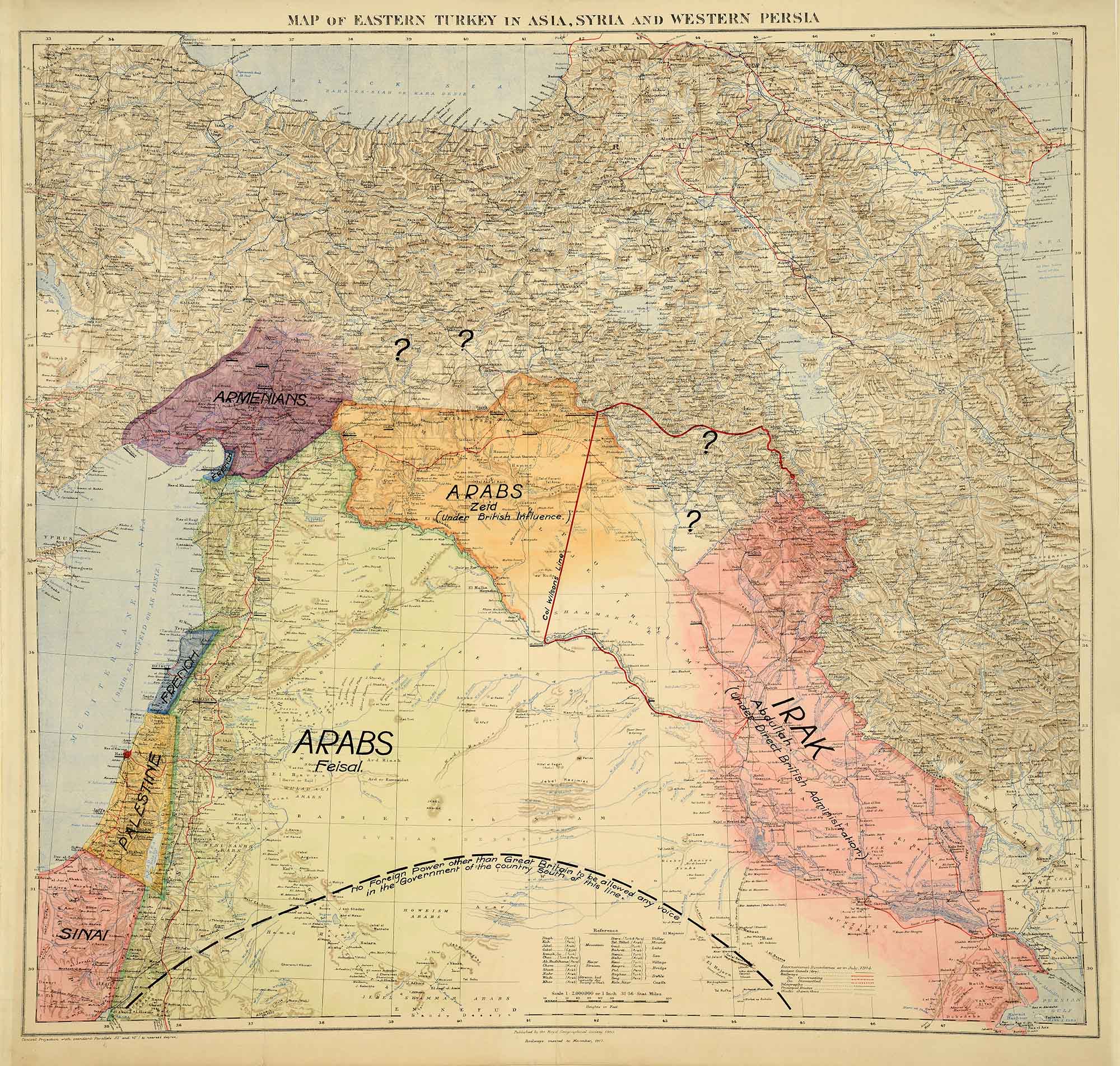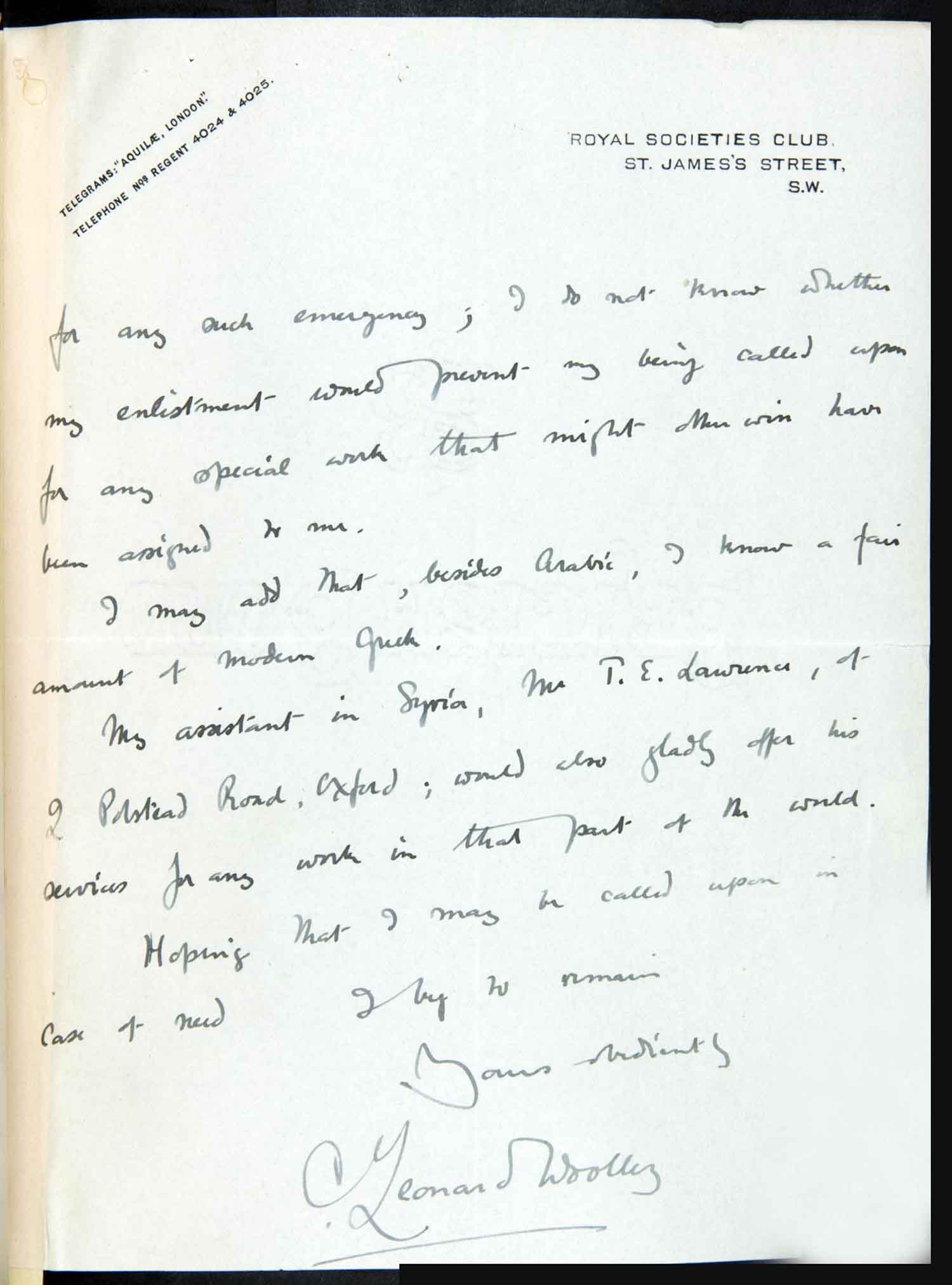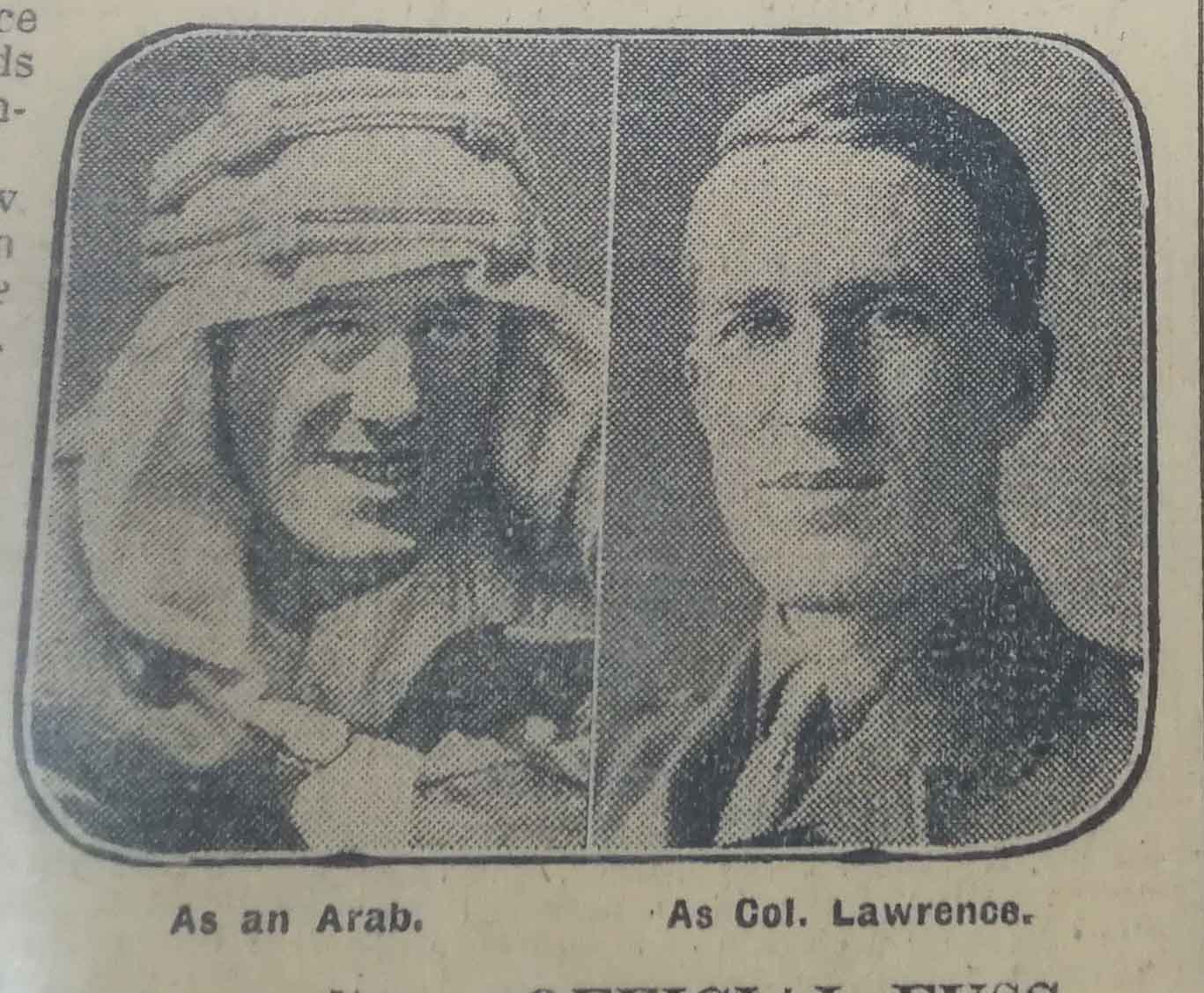T.E. Lawrence is a legendary figure, known for spying and fighting in the Middle East during the First World War. We assume we know him from David Lean’s classic film, ‘Lawrence of Arabia’, but there is much more of his life that we are most likely less aware of.
Almost entirely absent from popular culture is the fact that there was someone else – a woman – operating in the region in a similar capacity, at more or less the same time. Gertrude Bell is not a name that many will have heard of, but arguably she was even more influential in the Middle East than the famous Lawrence of Arabia himself.
With the help of archives, historians, and records experts it is possible to uncover the real story behind what we think we know. This is what The National Archives is aiming to do with our new podcast series, On the Record, which begins by looking at the topic of espionage. Using previously secret personnel files and government reports, we will uncover the true stories of famous spies. In episode one we focused on the ‘Archetype of a Spy’; in episode two we take an in-depth look at Lawrence and Bell.
To coincide with the second episode I spoke to Matt Norman, our host for all three episodes, about the stories of Lawrence and Bell and whether they were what he expected.
[Katie]: Like many, you had heard of T.E. Lawrence before making this podcast, but was there anything in particular in the documents that surprised you when exploring his career?
[Matt]: Despite the fame of David Lean’s ‘Lawrence of Arabia’, I only watched it for the first time just a year or so ago, before my involvement with this series. Just as with almost everyone else, my impressions of Lawrence were formed solely by the film. The image I formed of him was of a complex, broody, charismatic man of action. A bit arrogant too but certainly a romantic figure.
Before I had seen the film I had not realised that Lawrence was an archaeologist, and actually even after the film that was not a particular fact that stayed with me. So learning that archaeology was really his first calling was a surprise to me.
In some respects though, the film, while clearly a romantic portrayal, does reflect elements of Lawrence’s character quite accurately. Dr Desplat, who features in the podcast, seemed fairly convinced of his arrogance. That said, she also described him as being unpopular among his contemporaries and that was not something the film made much or anything of. As Dr Desplat explains though, Lawrence was certainly firmly embedded in the politics of the Middle East and though the importance of his role may, it seems, have been exaggerated by the film and by Lawrence himself, he was nevertheless a not insignificant character in the story of the region.

Middle East peace map presented to cabinet by T.E. Lawrence
1918. MPI 1/720/1
[Katie]: We also learn about Gertrude Bell in this episode. She is described as a ‘kingmaker’ and, like Lawrence, does not go undercover which we would traditionally expect of a spy. Did your own definition of a spy change through the course of researching and recording the podcast?
[Matt]: Yes, it did actually. I came to realise that that term ‘spy’ is often used inaccurately – I think I used it a little inaccurately myself during the recording of the podcast. It seems to me that just because someone works in intelligence, it does not mean that they are a spy and that, in fact, intelligence officers overseas are sometimes not actually trying to hide themselves at all. I guess the point is that intelligence, in this context, means information about the enemy – or information someone else may not want you to know. The way you get that intelligence varies – sometimes you need spies but at other times you just need people who know and understand a region or country, have important contacts and can accurately interpret or even influence events.
It is quite striking that most of us know so much more about Lawrence than Bell as, from what Dr Desplat told us, her role was perhaps more influential than Lawrence’s – presumably that’s all down to the film. Had David Lean decided to make ‘Bell of Mesopotamia’ rather than ‘Lawrence of Arabia’, the tables might have been turned.

Letter recommending T.E. Lawrence for assistance in Syria in time of war
August 1914. FO 371/2201
[Katie]: Of the spies that you talk about in the series, is there one that particularly stands out for you?
[Matt]: I think for me, as for a lot of people, the stories of double agents are particularly compelling – proper spies. The story of the Cambridge Five, which is discussed in the third episode, is really captivating. The fact that so many of these double agents were working undercover within the higher rungs of the political establishment, and the ease with which they seemed to establish themselves in those positions, is really quite staggering. The story has all the hallmarks of a John Le Carré novel. It’s also interesting to hear about what kind of people they were – and what kind of people make good spies. That popular image of the spy, of James Bond, is almost the opposite to what you actually want from a spy and, indeed, what these people were actually like.

Photograph of T.E. Lawrence taken from a cutting of the Daily News 4 February 1929. WO 374/41077
On the Record: a new podcast series
Episodes one and two are now available on the Archives Media Player and on podcast listening apps. The third instalment will be available from 17 May and will focus on the Cambridge Five – possibly the most famous spy ring in British history.
Subscribe: iTunes | Spotify | RadioPublic | Google Podcasts
To find out more about espionage, as well as life in Britain during the turbulent Cold War era, you may be interested in The National Archives’ Cold War season, which includes a new exhibition: Protect and Survive: Britain’s Cold War Revealed.
The first thing to say that T E Lawrence was an adopted name and not his real name, he was born out of wedlock. Two files at TNA (T 1/11607/3627: British Museum. Staff arrangements for excavations at Asyut, Egypt, and Carchemish, near Jerablus, Asia Minor (ancient Hittite capital). [T.E.Lawrence was one of the excavators at Carchemish]) and T 144/1: Copies of Out-letters from the Treasury to the British Museum show that he was an archaeologist before embarking on an Indiana Jones type existence, more like a ‘rabble-rouser’ who was responsible for the state of Middle East unrest, this has been in the catalogue for some years and researchers only have to look.
If there was a “Lawrence of Iraq” it was St John Philby, not Bell. His expeditions would also have been legendary if they hadn’t been sidelined/suppressed by Col AT Wilson who (re-)wrote the official histories. Fortunately for Wilson’s reputation, Philby went into dangerous areas and consequently did not outlive WWI – this left few people with the courage to stand up to him and call out the mismanagement of Mesopotamia during and after WWI.
(Lawrence was one of those critics.)
Gertrude Bell instead operated as a “diplomatist” – a curious semi-official role that was only possible because of the chaotic and sparse political governance in the Anglo-Indian army, which had one eye always turned east to Persia. She was an interesting character, without a rank, outside the military organisation – a very traditional upper class lady. She represented Britain’s old order, and even complained that women’s suffrage was wrong. Her major contribution to the Anglo-Indian war effort was probably her contributions in compiling the Who’s Who of Mesopotamia. Her major contribution to Iraq was advising Faisal how to navigate Whitehall and Indian officials. A significant character but no spy. Like Philby, she did not outlive the campaign. Had she survived, a more accurate account of the campaign may have gained currency, and the 1919-20 revolt may have been ameliorated.
WWI saw a plethora of real spy stories … such as Bauermeister, Spies Break Through; Jones, German Spy In America; Hall, Steinhauer Master Spy; Russell, True Adventures of the Secret Service; Landau, Spreading the Spy Net; & Secrets Of The White Lady, Sidney Reilly-Adventures; McKenna, LancerSpy… the list goes on
Bell worked with my great-grandfather in Basufan in Syria (Musa family). She photographed them and mentioned them in her memoirs.
I am just reading “Queen of the Desert” by Georgina Howell – the life of Gertrude Bell. Very informative and interesting.
Regarding the Colin Fenn comment above, Philby did not die during WW1 and went on to have a significant postwar career. Also, he was more associated with Saudi Arabia than Iraq. Is Philby being confused here with Captain William Shakespear ?
I have entered into a lot of research on T E Lawrence and do not agree with this podcast. The selection of material is very limited giving a bad sense of what Lawrence did during the Arab Revolt and beyond.
Gertrude Bell was as used by the British government as Lawrence was. She was persuaded to support the Saudi’s and backed Ibn Saud against the Hussein’s. This must have added to Lawrence’s misery. Lawrence was also led to believe that if he and Faisal were first to enter Damascus then Faisal and his Arabs would have negotiating power for the territory if Arabia. To this effect General Allenby, asked the allied forces to hold back on entering Damascus to allow Lawrence and Faisal to take Damascus. It is a well known fact that the General of the Australian Lighthorse could not resist entering Damascus first, effectively destroying any negotiating power that Lawrence might have had. My question to this archival researcher is, where was Gertrude Bell during the taking of Damascus? Nowhere to be seen! Of course, she was a woman and in those days would not be involved in soldiering. As unusual as Bell was she was not the better person.
I think theses 2 podcasts are very biased against Lawrence and try to bust the myth. The legend in fact is very well earned. The man himself is so much more interesting than the one dimensional character displayed in the film by Peter O’ Toole. Though I understand how impossibly difficult it must be to capture anything of a person’s life in a 3 hour (4 hr?) film, let alone someone as complex as Lawrence.
Lawrence has had a lot of detractors over the years but you cannot ignore the many, many extraordinary comments by people who knew him. I give you a few here:
Jock Chambers, a Sergeant Major at RAF Farnborough in the RAF with Lawrence:
“…my only real friend, the only one I ever had. He was one of the finest men who ever trod the globe, better than Christ or any of them. He hated injustice”.
Worth noting that Lawrence at University decided the greatest man who ever trod the globe was Jesus Christ and decided to emulate him and lived an ascetic life, and amogst much else, generously sharing and giving away his possessions – Essenic or early Christian church behaviour and values.
Raymond Savage, T. E.’s Literary Agent:
“He was simple and sincere to a degree; he was a generous and magnificent friend and in his Christ-like character supreme”.
Francis Yeats-Brown, literary editor of The Spectator:
“He possessed a radiant physical awareness .. an Irish sense of humour, a cool, clear sparkling wit and had a power of giving happiness such as I have never known another man to possess … His mind so critical of himself, so charitable to others, had more bright facets than any other I have known. To be with him was to feel that one had bathed in some mountain spring”
S. C. Rolls, Lawrence’s driver in the Hejaz:
“I had never heard of Lawrence. Who had? Nobody knew what he had done or what he was doing, except Allenby and one or two of the senior officers who were his nominal superiors in the Arab zone. But this unexpected meeting meant more to me than the most sensational and true reports could have meant. The effect his arrival had on me was extraordinary. During all the aching boredom and labour of the past three weeks I had said to myself again and again, that if only I knew something of what it was I was working for, something of the object for which I supposed we should presently fight, I could have worked with ten times the willingness and ten times the ease. In this moment my carking anxiety and the feeling of puposelessness and of boredom left me completely, and I never knew it again throughout the war. My first sight of Lawrence brought me ease and happiness, a most satisfying feeling that my little labours had a purpose, and a fine one”. Steel Chariots in the Desert, pp 130-131.
Farida el Akle, his Arabic tutor in Syria who knew him before the war said it was not his exploits in the desert, fine though these were, but his excellent character. She says to Dick Benson Gyles, the biographer of The Boy in the Mask, “In 1909 I had the great opportunity of meeting T.E. and to get to know him personally. This was one of the greatest events of my life, if not the greatest …A deep friendship grew between us: it was a friendship founded on spiritual values. It was a spiritual unity of a soul with a soul. I cannot express it any other way. Lawrence lived in his spirit not in his body. He was marvellous. Such experience was most elevating most uplifting to me …”.
Henry Williamson and author of Tarka the Otter, “Never before and never since have I felt so free from myself, so without body: happiness beyond the conscious of happiness. This man understood a thought before it was uttered”.
All of these comments attest to not only Lawrence’s intelligence and extrardinary character but to his inate ability as a motivator and a leader.
John Buchan, Governor-General of Canada:
“There was no brush fine enough to catch the subtleties of his mind, no aerial viewpoint high enough to bring into one picture the manifold of his character….I am not a tractable person or much of a hero- worshipper, but I could have followed Lawrence over the edge of the world.”
Last but not least, General Wavell:
“He will always have his detractors, those who sneer at the “Lawrence Legend” who ascribe his successes with the Arabs to gold; who view the man as a charlatan in search of notoriety by seeming to seek obscurity; who regard his descent from colonel to private as some evidence of some morbid nostalgie de la boue. They knew not the man. Those who did, even causually and sporadically, like myself, can answer for his greatness. The complexity of his character the ‘mystery’ of Lawrence, on which so much has been written, seems to lie mainly in the fact that he transcended the ordinary heights in so many qualities: in courage, in knowledge, in self-discipline, in skill with his hands, in artistry of words, in sympathy with the common working man and with the scholar in demanding so little from life for his body and so much – perhaps too much – for his mind. But I am not competent to analyze the man: all I can say is that he was cast in heroic but very human mould, and that it was good to know him.”
I think you should up date this 2019 podcast and represent Lawrence fairly. It is so tiring tonhave our best British heroes misrepresented in this way.
And on a final note, it was the British government that used Lawrence and made his life difficult if not at times unbearable. They used their spies in Lawrence and Bell abysmally (did Gertrude Bell commit suicide or did she take an accidental overdose or was she killed?) and to this day there is still trouble in the Middle East due to the dreadful Sykes-Picot agreement. The politicians should have listened to their man on the ground.